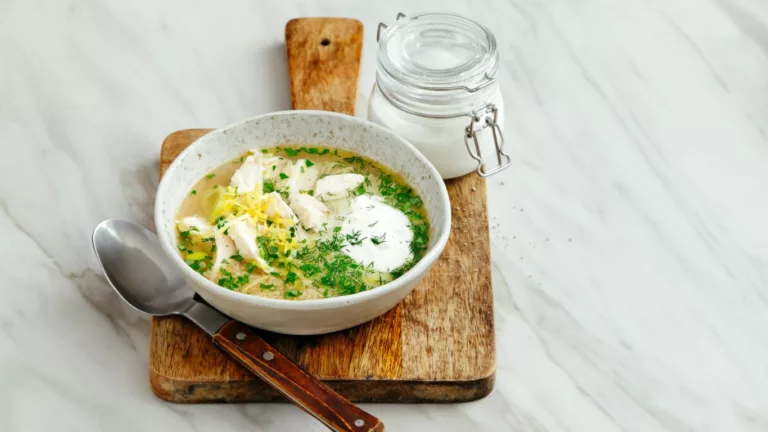Best Low-Acid Breakfasts for GERD: Delicious & Soothing Choices
Let’s be real—breakfast can be a struggle when you’re dealing with GERD. I’ve been there myself, staring at the fridge, wondering if my first bite of the day will trigger that awful burning sensation. Finding low-acid breakfast options for GERD that are both delicious and easy on the stomach isn’t always straightforward. But trust me, it’s possible! Over the years, I’ve worked with countless GERD patients (and tested a ton of meals myself) to figure out what actually works. Let’s talk about some satisfying breakfast choices that won’t leave you regretting your meal.
Why Your Breakfast Choices Matter for GERD

If you have GERD, your morning meal can set the tone for the entire day. The wrong foods can lead to acid reflux, heartburn, and discomfort that lingers for hours. But the right choices? They can keep you full, energized, and—most importantly—symptom-free.
Here’s the deal: GERD happens when stomach acid flows back into the esophagus, and certain foods can make this worse. High-fat, acidic, and spicy meals? Those are your biggest enemies. A GERD-friendly breakfast should be:
- Low in acid: Say goodbye to oranges and tomatoes first thing in the morning.
- Low in fat: Heavy, greasy meals can slow digestion and worsen reflux.
- High in fiber: This helps digestion and prevents overeating, which can trigger GERD symptoms.
- Easy to digest: Simple, whole foods work best.
Now, let’s dive into some tasty, GERD-friendly breakfast ideas.
Best Low-Acid Breakfast Options for GERD

1. Oatmeal with Bananas & Honey
If I had to name a breakfast that’s practically made for GERD sufferers, it would be oatmeal. It’s warm, soothing, and packed with fiber to keep acid levels in check. Plus, when topped with banana slices and a drizzle of honey, it tastes like a treat without triggering symptoms.
Why it works:
- Oats absorb stomach acid and help prevent reflux.
- Bananas are alkaline and easy on the stomach.
- Honey adds natural sweetness without irritating your esophagus.
2. Scrambled Egg Whites on Whole-Grain Toast
Eggs are tricky—while egg whites are fine, yolks can be too fatty for GERD sufferers. Stick to scrambled egg whites and pair them with whole-grain toast for a balanced, protein-packed meal.
Why it works:
- Egg whites are high in protein but low in fat.
- Whole grains provide fiber to aid digestion.
- Skipping butter or heavy spreads keeps fat content low.
3. Greek Yogurt with Soft Fruits
Some dairy products can be acidic, but plain Greek yogurt is usually a safe bet. Just be careful with the toppings—stick to low-acid fruits like melons or peeled apples.
Why it works:
- Greek yogurt is high in protein, which helps keep you full.
- It contains probiotics that support gut health.
- Low-acid fruits add natural sweetness without triggering reflux.

Breakfast Mistakes That Trigger GERD
Even if you think you’re making smart choices, some hidden culprits can sneak into your morning routine and wreak havoc on your digestive system. Here are a few common mistakes to avoid:
Drinking Coffee on an Empty Stomach
I know, I know—cutting back on coffee isn’t easy. But trust me, having a cup of joe before eating anything else is a recipe for disaster. Coffee is acidic and can relax the lower esophageal sphincter (LES), making reflux worse.
Choosing Citrus Juices
Orange juice and grapefruit juice might seem like a healthy choice, but they’re incredibly acidic. If you need something refreshing, opt for herbal tea or a smoothie with non-acidic fruits instead.
Going for Fried or Greasy Foods
Bacon, sausage, buttery croissants—these are breakfast staples that can trigger GERD symptoms in minutes. High-fat foods slow digestion and increase acid production, so it’s best to steer clear.
More Low-Acid Breakfast Options for GERD

By now, you’ve got a solid idea of what makes a GERD-friendly breakfast. But let’s be honest—eating the same thing every morning can get boring fast. Variety is key to keeping meals enjoyable while still being gentle on your digestive system. Here are a few more low-acid breakfast options for GERD that I personally love and recommend to my patients.
4. Smoothie Bowls with Non-Acidic Fruits
Smoothies can be a lifesaver when you need something quick, refreshing, and easy on your stomach. But the trick is choosing the right ingredients. Avoid citrus fruits, berries, and pineapple, which can trigger acid reflux. Instead, go for a blend of banana, avocado, and almond milk for a creamy, satisfying breakfast.
Why it works:
- Bananas and avocados are alkaline and soothing.
- Almond milk is a great non-dairy alternative that won’t trigger reflux.
- Adding oats or flaxseeds can boost fiber and keep you full longer.
5. Cottage Cheese with Sliced Melons
If you’re looking for a protein-packed breakfast that won’t upset your stomach, cottage cheese is a fantastic choice. Pair it with honeydew or cantaloupe for a naturally sweet, low-acid meal.
Why it works:
- Melons are naturally low in acid and hydrating.
- Cottage cheese is rich in protein but gentle on digestion.
- It’s a simple, no-cook option for busy mornings.
6. Chia Pudding with Almond Milk
Chia pudding might not be the first thing that comes to mind for breakfast, but trust me—it’s a game-changer. It’s light yet filling, and when made with almond milk and a drizzle of honey, it’s both nutritious and delicious.
Why it works:
- Chia seeds are high in fiber, which supports digestion.
- Almond milk is low in acid, making it a great dairy alternative.
- It’s easy to prepare overnight for a grab-and-go meal.
How to Build a GERD-Friendly Breakfast Routine
Creating a morning routine that keeps GERD in check is just as important as the foods you eat. Over the years, I’ve found that small tweaks can make a huge difference in preventing acid reflux throughout the day.
Eat Smaller, Slower Meals
Rushing through breakfast or eating too much at once can put extra pressure on your stomach, increasing the risk of acid reflux. Instead, try eating smaller portions and taking your time to chew properly. I always remind my patients: your stomach doesn’t have teeth—chew your food well!
Time Your Breakfast Right
Eating too late in the morning can throw off your digestion. Try to have breakfast within an hour of waking up to keep your digestive system running smoothly. And if you’re someone who wakes up with heartburn, sipping warm water or herbal tea first can help soothe your stomach before eating.
Avoid Lying Down After Eating
One of the worst things you can do after breakfast is go back to bed or lounge on the couch. Lying down too soon can cause stomach acid to creep up, leading to that dreaded burning sensation. If you need to rest, try sitting upright for at least 30-60 minutes after eating.

GERD-Friendly Morning Drinks
What you drink in the morning can be just as important as what you eat. Unfortunately, many traditional breakfast beverages—like coffee, orange juice, and black tea—can trigger GERD symptoms. But don’t worry, you’ve got plenty of reflux-friendly alternatives.
Herbal Teas
Not all teas are created equal when it comes to GERD. While green and black teas can still be acidic, herbal teas like chamomile, ginger, and licorice root can actually help soothe your stomach.
Warm Water with Honey
One of my personal go-to morning drinks is warm water with a teaspoon of honey. It’s simple, hydrating, and naturally soothing for the digestive tract.
Almond or Oat Milk Lattes
Missing your morning latte? Try swapping regular milk for almond or oat milk and using a caffeine-free alternative like chicory root “coffee” or carob powder. It gives you that cozy coffee-shop experience without the reflux flare-up.
Case Studies & Real-Life Examples

Over the years, I’ve worked with many patients struggling with GERD, and one thing is clear—what you eat in the morning can make or break your day. Let me share a few real-life stories that highlight just how powerful a GERD-friendly breakfast can be.
Emma’s Story: From Daily Heartburn to Symptom-Free Mornings
Emma, a 35-year-old teacher, used to grab a cup of coffee and a buttered bagel every morning before rushing to work. By mid-morning, she’d be battling acid reflux and popping antacids. After switching to a breakfast of oatmeal with bananas and herbal tea, her symptoms almost completely disappeared within two weeks. Now, she swears by her new routine.
David’s Experience: Swapping Citrus for a Soothing Start
David, a 50-year-old business executive, loved his morning orange juice and eggs with sausage. But his GERD symptoms were so bad that he had trouble focusing during meetings. After cutting out citrus and processed meats, he switched to Greek yogurt with honeydew melon and a warm honey water drink. The result? No more mid-morning discomfort.
These are just a couple of examples, but I’ve seen similar transformations time and time again. The right breakfast truly makes a difference!
Key Takeaways: What You Need to Remember
Let’s sum up the most important lessons from this guide. If you take away anything, let it be these simple rules:
- Stick to low-acid foods: Avoid citrus fruits, tomatoes, and processed meats.
- Choose fiber-rich options: Oatmeal, whole grains, and chia seeds can help keep reflux at bay.
- Limit fat intake: Skip greasy breakfasts and opt for lighter, protein-packed meals.
- Watch your beverages: Coffee and acidic juices are common triggers—opt for herbal teas or honey water instead.
- Eat mindfully: Smaller portions and slower eating can prevent reflux symptoms.
FAQs
Can I still drink coffee if I have GERD?
Sadly, coffee is one of the biggest culprits behind acid reflux. If you can’t give it up completely, try switching to decaf or opting for a less acidic cold brew. Otherwise, herbal teas and warm honey water are great alternatives.
Are eggs safe for GERD?
Egg whites are generally safe, but egg yolks can be too fatty and may trigger symptoms in some people. If you love eggs, try eating just the whites and skipping the butter or oil when cooking.
What’s the best bread for a GERD-friendly breakfast?
Whole grain or whole wheat bread is usually the best choice. Avoid white bread and anything heavily processed, as they can cause bloating and worsen acid reflux.
Can I eat cheese in the morning?
It depends on the type of cheese. Soft cheeses like cottage cheese and ricotta are usually well-tolerated, while hard or aged cheeses can be too acidic and fatty. Always listen to your body!
Bonus: Additional Resources & DIY Tips
Want to take your GERD-friendly mornings to the next level? Here are some extra tips:
DIY GERD-Friendly Breakfast Recipes
- Banana-Almond Oatmeal: Cook oats with almond milk, add sliced bananas, and sprinkle with cinnamon.
- Chia Pudding Parfait: Soak chia seeds in almond milk overnight, then layer with honeydew melon and a drizzle of honey.
- Scrambled Egg Whites & Avocado Toast: Use whole-grain toast, top with mashed avocado, and add soft scrambled egg whites.
Recommended External Resources
- Mayo Clinic – Trusted medical advice on GERD and acid reflux.
- PubMed – Research-based studies on GERD-friendly diets.
- WebMD – Practical GERD management tips.
Appendix
Food Comparison Table
| Food Category | Safe for GERD | Trigger for GERD |
|---|---|---|
| Fruits | Bananas, melons, apples (peeled) | Oranges, tomatoes, pineapples |
| Dairy | Greek yogurt, cottage cheese | Full-fat milk, aged cheese |
| Grains | Oatmeal, whole-grain bread | White bread, sugary cereals |
| Proteins | Egg whites, lean turkey | Sausage, bacon, fried foods |
| Beverages | Herbal tea, almond milk | Coffee, orange juice |
Disclaimer
The information in this article is for educational purposes only and should not be considered medical advice. Always consult with a healthcare professional before making changes to your diet.
Call to Action
Struggling with GERD and need more guidance? Subscribe to my newsletter for more digestion-friendly tips and exclusive meal plans. Let’s make your mornings reflux-free!

Camellia Wulansari is a dedicated Medical Assistant at a local clinic and a passionate health writer at Healthusias.com. With years of hands-on experience in patient care and a deep interest in preventive medicine, she bridges the gap between clinical knowledge and accessible health information. Camellia specializes in writing about digestive health, chronic conditions like GERD and hypertension, respiratory issues, and autoimmune diseases, aiming to empower readers with practical, easy-to-understand insights. When she’s not assisting patients or writing, you’ll find her enjoying quiet mornings with coffee and a medical journal in hand—or jamming to her favorite metal band, Lamb of God.







